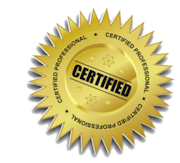This post, originally written in January 2011, was accurate at the time; there was no universally recognized patient advocacy certification.
That changed in early 2018 when the first certification exam was offered by the Patient Advocate Certification Board. As of June 2021, there are currently 889 BCPA certified advocates. Find updated information at the end of the post.
(Updated: June 2021)
I hear frequently from people asking about certification for patient advocates. It’s confusing, because they read that there are courses that will help them become certified, and then they find other pieces I have written about the lack of a certification system.
So it’s time to clarify: There is a difference between earning a certificate – and being certified, even if Merriam Webster might tell you those two concepts are related.
 “To be certified” carries with it an assumption that there is some sort of national (even international) standard set of skills, recognition, accreditation, or competencies and criteria that someone has met, developed, or earned. As if a national body of some sort has said “Yes – this person meets this high standard of education and capability, so we are blessing him or her with our certification.” “To be certified” may even mean to some people that some sort of governmental recognition in the form of a license or listing has taken place.
“To be certified” carries with it an assumption that there is some sort of national (even international) standard set of skills, recognition, accreditation, or competencies and criteria that someone has met, developed, or earned. As if a national body of some sort has said “Yes – this person meets this high standard of education and capability, so we are blessing him or her with our certification.” “To be certified” may even mean to some people that some sort of governmental recognition in the form of a license or listing has taken place.
But as of 2011, there are no governments, nor nationally respected, nor generally accepted groups that have determined a group of standards, nor benchmarks, nor capabilities that supply a certification that is universally recognized. And that is the key: none are universally recognized.
No such a certification exists – yet.*
The confusion comes from the fact that there is a growing group of educational organizations, running workshops, webinars, courses and programs that culminate in a certificate of completion.
It’s great that so many institutions are teaching people to become professional patient advocates! However… The certificate earned by taking one of these programs is only a certificate that says someone completed those programs. It does NOT say that person meets any nationally, or internationally list of recognized standards.
Don’t get me wrong. Many of these programs are excellent, because patient advocates are building their skills and knowledge, and because their work grows our profession. But those certificates don’t stand up to each other. Someone earning a certificate from one institution or group has not learned or developed, nor can they then apply to their client-patients, an equal skill set to those who have earned a certificate from another group. Read more about the alignment between patient or health advocate certification and educational programs.
So – the answer today (in 2011) is – NO – there is no nationally recognized and respected patient advocacy certification for private, independent patient advocates – yet. (See update below for 2018.)
If you are a patient or caregiver, don’t be fooled into thinking that just because someone has completed one of these programs, that they are recognized to have met any standardized set of criteria. If an advocate claims to be certified, ask about that certification to be sure you are clear on what they have achieved.
. . . . . . . . . . . . . . . . . . . . . . . . . . . . . .
* Updated 2018: Patient Advocate Certification is now available!
The Patient Advocate Certification Board, working since 2012, began to offer its first nationally recognized and respected certification in March 2018.
Now hundreds of professional advocates have earned their certification! Find the master list of advocates who have earned their BCPA (Board Certified Patient Advocate) here.
. . . . . . . . . . . . . . . . . . . . . . . . . . . . . .
Share your experience or join the conversation!
LEARN ABOUT APHA MEMBERSHIP | TWITTER | FACEBOOK






I have a bit of a different view on Certification and the programs that exist. (For transparency for readers, Healthcare Liaison, my company, developed the first Certification program in the country for Healthcare Advocates in 2007 (We don’t call anyone a patient!), but we only train people who are already medically trained. So the Certification that we issue says “Certified by Healthcare Liaison, Inc.” We are able to issue continuing education credits through the American Nurses Credentialing Center (a nationally recognized program) for the content of the program. So the public can know that the course itself has been reviewed and approved by an outside, impartial agency.
Healthcare Advocacy is a new profession, and the way new professions begin their certification journey is exactly what we are seeing here: many systems create programs (think about life coaching: there are at least four programs that certify in that area). It started as one program: now there are at least 10 nationwide. But who will look at these courses? The National Association of Healthcare Advocacy Consultants, which I also started, is the National Professional Organization for Advocates, and we will be addressing the Certification program issue. So readers can rest assured that the there are programs and systems moving into place that will assure consumer protection. I expect, over time, there will be regulation of this profession by individual states (i.e., state licenses). In the meantime, readers can check the NAHAC web site (www.nahac.com) for the Code of Ethics for the Profession.
The profession is exciting and evolving!
Pingback: Tweets that mention The Myth of Patient Advocacy Certification | AdvoConnection: Health Advocates in Action -- Topsy.com
I cannot thank you enough for this timely posting. I was becoming dismayed and overwhelmed as I read about all the webinars and courses–online and otherwise–that were being offered. I saw some of these as early money-making schemes and tried not to feel cowed into submission. Still, there are some courses I plan to take to fill educational gaps. But the distinction you made between having earned a certificate and being a certified patient advocate was an excellent reminder.
I think it would be a rather difficult task to “certify” someone in Patient Advocacy”. What might the criteria be?
Robert – a very good question. We’ll develop a certification system eventually, just as professions of all sorts have done for decades. There will likely be different types of certifications for the various types of advocacy that exist (navigators, billing experts, geriatric care, others). There will also have to be different certification levels to accommodate for differing backgrounds. For example, a nurse who becomes a certified patient advocate will end up with a different certification from someone who develops advocacy expertise but does not have a healthcare background to begin with. To become certified, advocates will have to show a track record, take a test, be recommended, or any of a variety of “proofs” that they know what they are doing and can do it well.
For now, none of this exists in a universally-recognized way. Joanna described her approach to “certification” (see above) – but that’s what it is – her company’s approach. If you would ask another of the organizations that prepares patient advocates, they might not agree that Joanna’s organization’s criteria are equal to theirs – or Joanna might tell you that her group is better prepared than someone else’s.
The key is that “universal” agreement and recognition – and that’s what we will develop – eventually. It just doesn’t exist today.
Even though there is not a universal “certification” for becoming a Patient Advocate as yet, anyone hiring a Patient Advocate should carefully interview the individual under consideration first….just as you would if you’re an employer hiring an employee. Ask: What experience do you have? What are your skills? How long have you been a Patient Advocate? What are the personal qualities you bring to the job? Can you give me referrals of previous clients? Why should I hire you? How can you improve our current status?
Sheryl Kurland
Orlando Patient Advocates
Sheryl — excellent point! Those are great questions. We have a master list of questions at the AdvoConnection for Patients site. Find them here:
How to Interview a Patient Advocate
I think since we are talking about “patients” that anyone who advocates for them has to have a medical background. If you don’t understand the disease state that someone may be in chronic vs acute or both you cannot understand anything else in their life that is affected. If it’s insurance you need to understand their medical issues, if it’s resources you need to understand the medical issues to connect them to the right resources. So it is my opinion that all advocates should have a medical background. We have people out there who tout themselves as advocates who may have been in sales, or helped their grandparent or parent or maybe worked in some administrative role somewhere in healthcare who think they can advocate for patients. If we aren’t talking about patients then almost anyone could advocate for anyone if they understand the core issues. Patient’s issues are ALWAYS related to medical issues. Now that long term care facilities taking in anyone who is sick regardless if they can accommodate their needs as the evaluation criteria for acceptance is their payor source, it is a problem that I see every day with social workers who are charged with discharge planning and can’t appropriately discharge many of these patients safely because they don’t have time to find out what “discharging to home” means. There’s a lot of questions to ask and if you don’t know what to ask then you’re not advocating right.
Certifications started in nursing to replace education that was going to be mandated for nursing many years ago. Because there was such an uproar from pratical nursing and other fields the ANA’s response to this was to get certified. This has turned into a huge money maker and I’m not convinced it means a whole lot. If you hold a degree that took many years to obtain and you have a lot of experience its worth much more than a three month course that buys you a few letters at the end of your name.
So that’s my two sense worth…Happy New Year Everyone
sharon:)
Sharon Gauthier RN/MSN-iRNPA
Independent RN Patient Advocate
I appreciate the article but must also respectfully disagree with your assertion that a patient advocate must be medically trained. I have worked on the financial side of healthcare in cancer care, hemophilia and transplantation. Each of these treatment centers involve extremely high cost services and as a self-identified patient advocate, I recognized the need for helping patients and families understand the financial ramifications of their healthcare choices (often following whatever direction the doc told them to take). Will a certain treatment prevent death or will it cost $200K and only prolong life for 3 years or so? What happens to a spouse when all assets are depleted and one income is gone from the partner dies?
We must consider that in this country there are three clear areas of interest in the healthcare setting:
Provider — wants to offer the highest and best care available without (a) being sued for malpractice or (b) not being able to collect on the cost of services provided. No one can keep the doors open if the revenue isn’t there.
Payer — insurers, Medicare and Medicaid, TriCare, the VA system and others must continually weigh the efficacy of a treatment in light of the cost. Admit it, everyone talks about this from Congress to the Prior Authorization folks at Insurance Company X.
Patient — wants the highest and best care but is cost adverse. Everyone who has medical coverage can become confused about what it covers the minute a diagnosis is provided. What are my options from a health perspective? What is my insurance going to cover? What will my patient balance be after my insurance pays? Will my family go broke?
This, my dear friends, is how I view the Patient Advocate role: Helping individuals who access healthcare to understand the system, who plays what role in their care, how the billing works (i.e. many different bills from different providers — hospital, labs, physicians, etc — for one stay) and how to keep from losing their shirt while getting the best care for their condition.
This is very much akin to the crisis that led to the housing bust. Everyone wanted the BEST for the LEAST, which is not a sustainable model. Now everyone says, “but nobody told me!” We need to educate patients on the SYSTEM, not on the disease state. That is the doctor’s role. Without understanding the process of how care is paid for, none of it matters unless one has an unlimited amount of cash on hand.
Kindest regards,
Sharon,
While I understand your arguments, I have to respectfully disagree with you. Some of the best advocates available to patients today are not nurses, have never earned doctors or nurses degrees, yet have saved many lives and immeasurable heartache and grief.
For more on this, please read: Do I have to be a nurse to be a patient advocate?
Thanks for posting.
Trisha
The time has passed for advocates to be ONLY nurses, doctors, social workers or any other healthcare professional. When medical systems told consumers that they were becoming responsible for more of their own healthcare (by medical savings accounts, higher co-pays etc.), they effectively said to the public “go become an advocate for yourself because the “first dollars” are going to come from you”. People did exactly that, and some of them became extremely talented healthcare advocates.
Yes, the consumer needs to be careful about choosing an advocate, just like choosing any other professional. The medical system will be shooting themselves in the foot (again) if they think that only medically trained people can be effective advocates.
Hi Trisha, Thank you for your candor and website. It’s wonderful! I’m learning a lot! I am building my aforementioned website because, regretably there is no “real advocacy” for the patients enrolled in our state sanctioned, voter approved (in 1998), “Oregon Medical Marijuana Program”. After reading what you have to say, I’m beginning to think that the mere existence of such an entity was, quite possibly, intentionally suppressed, dismissed or ignored. I am still researching why this caveat was not included. Based on some of my initial queries, just this Feb & Mar 2011; the official attitude is “…you’re on your own.” I would like to be one of many trail blazers, to encourage my fellow patients, to “have a voice” in the “advocacy” & “legal process” too. Not a very desireable idea in the eyes of a variety of extremely “well-connected” caregivers, groups, blogs & “non sanctioned dispensary clubs” that troll for patients to “donate” or “exchange” $$$ for their assortment of products. The “sticker shock” alone is huge for many fixed income patients, of which @least 40% are noted in the state statistics as such. It’s a shame. There are apparently “thousands & thousands” of questions, concerns & complaints from patients directed to the state program & the advocacy board. Apparently, none of these thousands of queries have ever been addressed. That alone, to me, is shocking! So, one of my ideas is to become @least one “voice” for patients just to really start the dialogue & get it out there. Thus the new website I’m creating. I look forward to your response, whether positive or negative, it’s all good in the long run. There are, @this juncture, @least 15 states (with half a dozen or so more in the legislative wings) that have medical marijuana programs. So far, I’ve found not one state’s law that allows for patient advocacy. I find that in and of itself very peculiar. Thank you for reading my long winded comment. Sincerely, PattyB
How does restricting eligibility to your program to those already in the medical field benefit…those for whom you advocate (since you reject “patient”)? Am I the only person that finds that such an arrangement could benefit the healthcare professional rather than the…advocatee? If I am the only paranoid individual out here it’s because I must be the only one who sees that those very health care professionals are part of the problem. If your exclusive methods become the norm (for which you are no doubt striving, since it would mean great monetary success for your firm), why not just trust things to hospitals to do right? After all, by your model (and by your patronizing tone) we are supposed to believe that healthcare professionals know what is best for…those in their care.
Thank you for bringing that up Tre. I agree it’s like the old saying “putting the fox in the hen house”? From my experience over the years of seeing healthcare professionals it has become more apparent of the lines drawn between them and the healthcare payers. I think this bias could carry into any advise they would have for people seeking advocacy help; and lets face it, the help folks are seeking does not stop at insurer issues it also involves provider issues, as-well-as other non-medical issues. So I feel they may not be the “best” advocate or, should I say the the only qualified advocate. Sharon is getting hung-up on the terminology “patient” and I do agree with her in the respect that a “patient” is someone that is under the care of a licensed healthcare professional for some sort of disease management. But in the context of what we are discussing here, in many cases that is only one piece to the puzzle. I think it is short sited and arrogant thinking that only a licensed medical professional is qualified to be an advocate and I feel it would be a dis-service to people seeking advocacy help to have their choice limited to just licensed healthcare professionals. As Sharon said, it is a new profession (with people of varying backgrounds) and it will evolve in time to have a universal education and certification process in-place. Bottom line is that advocacy consultants, no matter what your background, are to help and protect the consumer…not the healthcare industry.
healthcare advocacy is a wide open field, and there now are more than 15 programs nationwide training healthcare advocates. each program may have a niche–the Healthcare Liaison one is training people who already have medical licenses. HCL does have a demonstration project currently underway with a tweaked curriculum for the non-medically trained; some consumers will want medically trained advocates, but some will not, and there will be all kinds of advocates for consumers to choose from.
I’m really glad I found this website as I was looking to see what was needed to become a Patient Advocate. I have the medical background. But what do you suggest the next steps are to become an advocate ? We still need to know the laws and keep on top of them, and we still need to know how medicare and medicaid pay for different services (I have 3rd party experience.) Any suggestions would be great ! Thank you.
Ted (great name) – Your best bet for learning next steps is to read these articles, and to join the Alliance of Professional Health Advocates http://APHAdvocates.org It will allow you to find answers to all the questions you have asked, connecting you with others who are preparing to do advocacy work – and – people who have been doing advocacy work for years. We’d love to have you join us.
Having been a Patient Advocate Program Manager at a large Sub Acute/LTC facility…we created the program from infancy. Every minute detail was closely monitored and discussed as to what was best for the patient. The problem that we ran into m-a-n-y times, was the things that got missed by a CNA, RN, LPN or doctor! Because of the cut back in medicare…the trickle down theory ends up eventually in the advocates lap. We were a vital part of the team in general – and a voice for those that are voiceless. We didn’t need a medical background to communicate basic needs of the patients. What with healthcare changing dramatically over the next few years… it’s going to be even more important to have an advocate working on behalf of the patients. We were the eyes, ears of the facility. We saw things that the average healthcare worker was too busy to pick up on. I’m not putting blame on any particular area…but the quicker we pull this together and give credence to the vital importance of the advocates, it becomes a win – win for all involved.
I’m glad to have found this discussion, as I too am exploring whether or not I want to delve into the field of advocacy via a certification program. Like Ted, I have a background in health care. I’m saddened to see that a few here have such low opinions of health care professionals as a whole. I think the reasons for getting into advocacy are the same, regardless of background. As a health care professional, though, I have a different perspective. I also have my own experiences with providing services in different environments (homes, schools, etc) that are equally as infuriating as working in say a nursing facility or a hospital. (Though I will say a nursing facility is the only place I ever felt I was dealing with serious ethical dilemmas on a daily basis.) There have been times where I wanted to advocate both for and against my employers, but while I have a basic understanding of the legal and ethical issues surrounding my job, I feel like I need a more in depth knowledge of these things before I could feel comfortable proclaiming myself as someone to help a family navigate the system. While you don’t need a medical background to do this, you do need to understand the system within which you are working, very well. Also, when I have been looking at certificate programs, there are differences – many of which are in the course work. I don’t need a course in medical terminology, but someone without a health care background would. So, the differences in programs and backgrounds seem not only logical but necessary. It would be great if there was some standard, but there are so many different routes to take with advocacy, finding a standard is going to be difficult and specialization will still be necessary.
Oh – and yes, Jeff, I said for and against my employers. In a consumerist system, there are more than a few who overuse and even abuse the system. This takes away from others who are less outspoken, in my experience. It also has created a system over saturated with unwarranted lawsuits. Providers get nervous, and some respond by over providing, while others become very cautious to do anything. Neither extreme is appropriate, nor best practice. In some of these cases, I’ve wanted to shout “LET THEM SUE!” because the consumer’s case is so poor, the threat of legal action so empty. An advocate should aim for best practice, high quality care based in evidence, law and ethics. If that is our goal, can we really say one side or the other is a “fox in a henhouse?”
I have been an advocate for nearly a decade around the United States and I do not have a medical background except from what I learned when my daughter died suddenly of septic shock from a refusal to treat from a doctor who lied to me and said that she was fine by a guess. I know more about the laws and procedures then most do in hospitals when it comes to how it affects us entirely as a whole meaning our pocketbooks, health in general when going into a hospital today, and all the money being WASTED at a time when we need to be watching our pennies instead of what the insurance industry wants and that is to deprive us of even more unless we jump through 25 more loop holes for them. 500 plus people die EVERYDAY, due to preventable medical errors because of the same silly stupid mistakes and the same percentage of doctors are doing the bad service yet are still practicing with a wake a dead people in their past that we are not allowed to know about because our medical boards are set up that way! Oh don’t get me started! I won Consumer Advocate of the Year and I did not have a medical background…just common sense.
Michelle – I am so very sorry to hear about your daughter. Your story breaks my heart, although I appreciate that you have learned everything you can and that now you reach out to help others.
And update on this “MYTH” post: a group of stakeholders has begun efforts toward determining a certification or credential. Learn more: https://aphablog.com/2013/03/01/is-patient-advocacy-certification-on-the-horizon/
Trisha
When it comes to Advocacy we need medical and we have had it, however WE NEED someone also that knows what it is like to feel their heart start to pound as they watch their child or loved one start to die. That is something that cannot be taught in books. To know what a person is going through when their child closes their eyes for the last time, to see their baby just leave forever and not come back in that moment takes special training. Not to many people can actually handle it and doctors are lets say….they have to be used to it. But for someone to know how it feels to live each and everyday from that moment forward is a gamble for all parents in those positions and their other children. This is what needs more understanding in the community. We need to see it from the victims point of view.
Thank you so much Trisha and I really appreciate what you have been saying! I am so glad that we are at this point of discussing this to improve this much needed and over due project. So I thank you.
Please see the note at the end of the original post (above) regarding a new initiative to determine a universally recognized patient advocacy certification or credential.